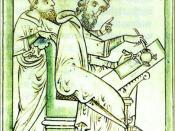One of the greatest literary minds of all time, William Shakespeare, gave these words to one of his characters, ?To be? Or not to be? That is the Question.? At each step a similar crossroad arises where one must choose a path or means to an end. Plato?s Republic tackles a similar question where Socrates must prove that ?to be just? is a more desirable and advantageous means to an end (which in this case is total life). In order to accomplish such an arduous task Socrates must disprove Thrasymachus definition of justice. In Book I Thrasymachus states that, ?Justice is the advantage of the stronger? (338c). He explicates this statement by pointing out that in all forms of government, whether it is a democracy, tyranny, or aristocracy, the leader is the cornerstone and landmark of the state. With this authority and power comes the ability to enact legislation that has a vested personal interest.
Thus, by creating the law the ruler determines what is just and what is lawless or unjust.
Socrates refutation of this statement comes in several parts. He initially points out that rulers can and do make mistakes; and these mistakes are naturally to the disadvantage of the ruler. However, members of the state, in order to be just, must abide by this law so that they may remain just. Therefore, it is just to do what is disadvantageous for the rulers, and perhaps advantageous for the weaker. Thrasymachus simply points out that, ?a ruler never makes errors and unerringly decrees what is best for himself? (341) because a craftsman is never judged in reference to his errors. Furthermore, Thrasymachus declares that to act justly is to secure good things for others, and to act unjustly is to secure one?s own interest (343e).
Socrates invalidates...


